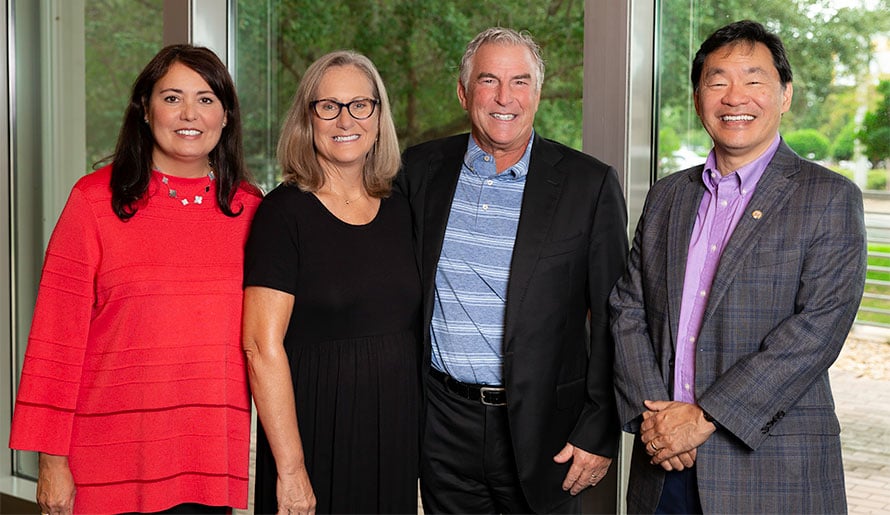Support the Pentecost Family Myeloma Research Center

At Moffitt Cancer Center, we believe a cure for multiple myeloma is possible, and with the right support and partnership, can be accomplished within 10 years. The Pentecost Family’s transformational gift is the cornerstone of our vision, allowing us to launch the Pentecost Family Myeloma Research Center (PMRC), maintain our timeline for ongoing research, and begin the leveraging internal and external resources to turbocharge myeloma research at Moffitt.
Multiple Myeloma remains incurable for roughly 85% of patients today. This makes finding new treatments and curative intent management strategies for patients all the more important — and Moffitt is poised to be at the forefront of these discoveries.
To make significant progress in our mission, our focus is on four key areas of research and treatment.
PRECURSOR STATES
Understanding precursor conditions is a fundamental part of developing new strategies to determine when, and in which patients, therapeutic intervention is appropriate. We believe that Moffitt’s personalized approach — to an individual’s myeloma genetic makeup and biology — holds the key(s) to preventing and curing multiple myeloma.
RESPONSE ADAPTED THERAPY
Myeloma is a heterogeneous disease, meaning that it can behave very differently from patient to patient. With a better understanding of the biology of the disease, and the many treatment options available, we should be able to tailor each patient's treatment according to response. Response adapted therapy will allow us to intensify therapy on those patients who need it or ease therapy in those patients who have already achieved an optimal response. We continue clinical trials incorporating this treatment approach both in the newly diagnosed and maintenance settings- striving for personalized management strategies for our multiple myeloma patients.
CELLULAR IMMUNOTHERAPIES
Chimeric antigen receptor (CAR) T therapy is changing the way the world approaches cancer treatment — and with an 85% response rate that often results in a complete response in patients with advanced multiple myeloma, its popularity and reputation are well earned. At Moffitt, one of the nation's leading CAR T centers, we see more potential for these and other powerful T cell engaging therapies, especially when they are administered to patients earlier in their treatment plan, when they are healthier and have less burden of disease.
NOVEL DRUG DEVELOPMENT FOR RECURRENCE
Patients with relapsed multiple myeloma have limited therapeutic options. Simply put, there is an urgent need for more tools to fight this disease for patients who have failed multiple lines of therapy. New agent development has altered the treatment landscape and improved outcomes for patients around the world. Most of these therapeutics were developed from a better understanding of the biology of multiple myeloma and the immune system. A major goal of the Pentecost Family Research Center is to develop new and effective multiple myeloma therapies.
PERSONALIZING MEDICINE WITH EMMA
Over the past three years, Moffitt Cancer Center has focused on developing EMMA (Ex Vivo Mathematical Myeloma Advisor), from a research tool into a clinical assay that provides oncologists with critical information regarding the application of the right therapy, at the right time, for the right patient. This work has led to over 40 manuscripts, three extramural grants and integration of the EMMA platform into two Phase II Moffitt investigator-initiated clinical trials.
Each multiple myeloma patient has a bone marrow biopsy before starting treatment. If they would like to participate in EMMA, they can choose to have a portion of their biopsy sent for analysis. In the lab, multiple myeloma cells are isolated from each biopsy and cultured overnight. The next day, the cells are dosed with 31 different multiple myeloma drugs. For the next five days, powerful digital microscopes snap live images of how the cells react to each drug every 30 minutes. The digital imagery is then used in combination with patient- and drug-specific mathematical models to predict how the individual will respond to the different therapies. The results are reviewed during the clinic’s weekly tumor board meetings and assist the medical team in making real-time decisions on therapeutic management for those patients.
Give now to support our quest for a cure and transform the standard of care for myeloma patients.
Want to learn more?
 The support from all our philanthropic partners makes a meaningful impact in achieving the goals we have set for the PMRC. For more information on how you can support the Pentecost Family Myeloma Research Center at Moffitt Cancer Center, please contact Tyler Wilson, Supervisor of Individual and Family Giving, at (813) 745-5641 or tyler.wilson@moffitt.org.
The support from all our philanthropic partners makes a meaningful impact in achieving the goals we have set for the PMRC. For more information on how you can support the Pentecost Family Myeloma Research Center at Moffitt Cancer Center, please contact Tyler Wilson, Supervisor of Individual and Family Giving, at (813) 745-5641 or tyler.wilson@moffitt.org.
Donate Now
Support Our Quest for a Cure and Transform Care for Myeloma Patients
Your support of the Pentecost Family Myeloma Research Center will accelerate progress in the understanding and treatment of multiple myeloma. Moffitt’s clinical and research infrastructure provides a unique opportunity to be a leading institution for change – helping save more lives. Thank you!
